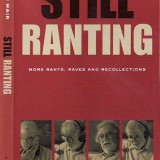I favour civil disobedience if it’s done responsibly and for good reasons.
Civil disobedience was practiced by Jesus; more recently Henry David Thoreau, the 19th Century American philosopher, is seen as father of the modern art of flouting authority. Thoreau had a strong impact on Mohandas Gandhi, who led protests first against South Africa’s laws against Indians (Gandhi lived there between 1893 and 1914) and later effectively against colonial powers in India. Gandhi and Martin Luther King are seen as 20th Century leaders in this field but one must include the entire civil rights movement and especially that in the Southern US in the 50s and 60s.
One must also remember the many acts of civil disobedience in BC in recent decades, especially those against killing old growth forests and the good that’s come of them.
Precise principles are hard to make but here are a couple from my own research and thoughts.
The cause must be “just” – not an easy word to define at the best of times – and has these elements:
- It is clearly a debatable issue in our society.
- There is a clear philosophical underpinning such as civil rights, immorality, an intrinsically evil law or policy.
- The public has been deprived of a fair hearing.
- There is no reasonable alternative.
- It is non-violent, which is a better word than peaceful.
The other side of the coin is the need of members of society to obey laws and only change them through the Legislature or Parliament. This “law and order” theme is the song of the “establishment” through whom unjust policy and law is manna from heaven and works substantially in their favour.
Until this day, slavery in economic chains of those who were freed from formal slavery is justified as “the law” but contains within itself my basis truth – this issue alone tells us how long it takes to get equality before the law and the impotence of decent people who simply want that for everyone. Unions and civil rights leaders have fought for basic justice for many years with every step painful and blocked by those who complain that they are outlaws – overlooking, conveniently, whose interests those laws support and how they came to be passed.
An interesting example is that of Lionel Nathan de Rothschild, a British banker and politician who was, in 1857, refused his seat in Parliament because, as a Jew, he could not (so the established MPs decided) take the Christian oath. Catholics were similarly rejected. Disraeli’s father had him baptized in the Church of England to avoid this problem.
Would anyone see these laws as supportable just because a parliament passed them?
Another famous case was Gandhi’s protest in 1930 in order to help free India from British control. He proposed and led a non-violent march in clear defiance of a Salt Tax which essentially made it illegal to sell or produce salt, allowing a complete British monopoly. Since salt is necessary in everyone’s daily diet, everyone in India was affected. The Salt Tax made it illegal for workers to freely collect their own salt from the coasts of India, making them buy salt they couldn’t really afford. This protest set Gandhi and the Congress Party on the pathway to Indian independence.
Could anyone seriously claim that this law, being passed by a colonial power, must be obeyed?
British Columbians today face huge assaults on their environment from those who control our legislatures. Let me deal with just two – pipelines and tankers, and private power producers (IPPS). In each case the environmental damage is monumental.
With pipelines and tankers, huge irremediable environmental catastrophes are not just a risk but a mathematical certainty with immense and lasting consequences.
IPPs are destroying – not just impacting – our rivers.
What chance to protest has been given the citizen? When did the citizen have the opportunity to affect IPPs politically? Their MLAs and MPs are not bound to the public’s interests but the party line from which they dare not deviate.
These same questions pertain to pipelines and huge oil tankers.
The answer is that worse than having no hearings at all are the phony hearings which permit no discussions of the merits (if any) of these proposals.
The argument is made that our legislators speak for us – the very argument used by the establishment to sustain slavery, keep black children out of “white schools”, outlaw labour unions because they were a conspiracy to interfere with employers’ right to set wages and working conditions, keep Jews from Parliament, to deny women the right to vote, to allow restaurants to keep Blacks out, and on it goes…
It’s interesting how the law deals with these matters today:
- First, legislators on the government side pass laws dramatically helpful to those whose money gets them elected.
- Second, they give away that which they hold in trust for us, to these corporations to desecrate for their own very profitable use.
- Third, people protest by getting in the way of the contractors’ relentless, uncaring and lawful abuse of our environment.
- Fourth, the corporation goes to Court and gets an injunction against the
protesters. (These hearings give no opportunity for the public to deal
with the “merits” of the project.)
- Fifth, the protests continue.
- Sixth, turning a civil act into a crime, the corporation seeks and gets an order to imprison these “criminals” – not for breaking any law, but for “contempt of court”.
Before this year is out I think we’ll have protests where decent, contributing citizens, wanting no more than to pass the province they love to future generations without the scars of private power development or spilled oil. They will go to jail for as long as it takes them to admit their “error”, as in other times, with similar legal machinery (Galileo confessed his “error” when he said that earth went around the sun instead of the other way around).
That’s right, these “criminals”, our friends and neighbours are sent to jail forever unless they recant and apologize.
It is thus democracy is practiced in our fair land.









